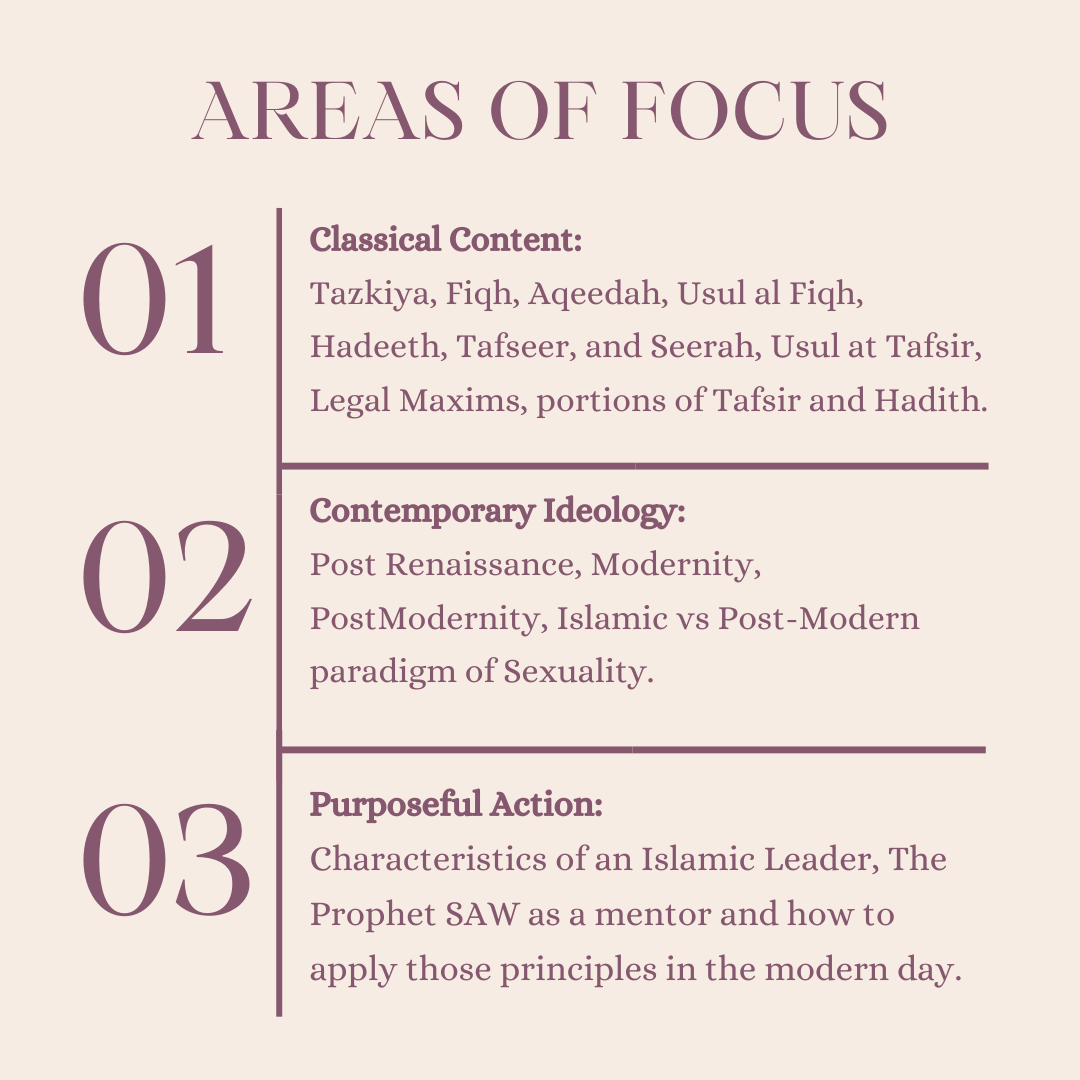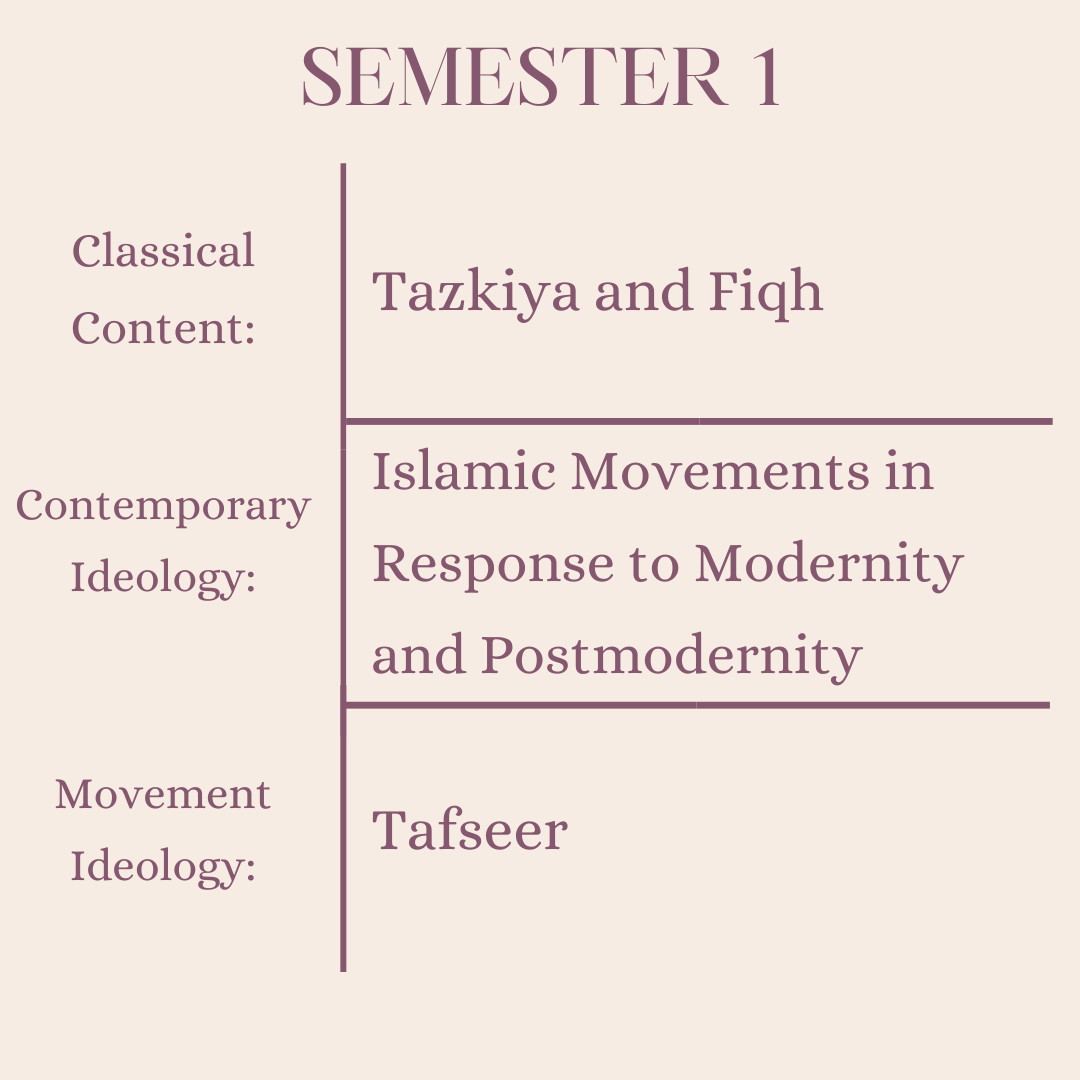
Bridging Traditional Islamic Knowledge with Shariah Compliant Activism:
Traditional knowledge and spirituality without sharia-compliant activism is like planting a tree without enjoying its fruits. Engaging in activism without traditional knowledge and spirituality can be detrimental to oneself and the larger community. The contemporary Islamic awakening suffers greatly due to these two extremes, so it is necessary to bridge this gap in a Shariah-compliant manner. As Imam Ghazzali رحمه الله (may Allah have mercy on him) said in his famous work “أ يها الولد” (Ayyuhal Walad):
“العلم بلا عمل جنون والعمل بلا علم لا يكون”
“Knowledge without action is insanity, and action without knowledge is void”


Course Details
- Tazkiyah in the Postmodern World
Contemporary Islamic awakening suffers greatly due to insufficient emphasis on the core teachings of Tazkiyah. In post-modern times, where the entire centrality and authority is given to human feelings and ‘self’, Tazkiyah becomes extremely important because it is the branch of Islamic knowledge that deals with the “feelings” and “self” of human beings and how to make those “feelings” and “self” compatible with divine guidance.
Books: We will review some chapters from the classical works by Imam Ghazzali in “إحياء” (Ihya) and Imam Ibn Qayyim in “مدارج” (Madarij) to understand their approaches regarding this important issue.
- Fiqh
We cannot reinvent the wheel in learning Fiqh; therefore, we will follow the methodology of Fiqh scholars, i.e., by going through basic (مبتدئ) Hambali Material by Shaikh Aamir Bahjat “التأهيل الفقهي”(At-Taheel Al Fiqhi), which Dr. Asif Hirani translated for his students. However, we will cover this in a comparative Fiqh style so that our students do not face the issue that most Muslims, especially in the West and generally everywhere, are witnessing, i.e. Madhab Factionalism vs Anti Madhhabism.
We will also briefly discuss the Evolution of Fiqh as covered by Shk. Aamir Bahjat in his work.
Books: Notes will have Hambali opinions, but we will discuss authorized positions (مفتى به) in Hanafi, Maaliki, Shafi as well as Ibn Taymiyyah and Imam Ibn Hazm’s positions as well.
In fact, it would not be far-fetched to say that disagreement between classical scholars has helped define the borders of “orthopraxy” as much as agreements have.
- Islamic Movements In Response to Modernity and Postmodernity
Post Renaissance, Modernity, Post-modernity and analyzing different Islamic movements in their response to modernity – Dr. Asif Hirani designed this course after researching contemporary movement-oriented scholars such as Shaykh Abul Hassan Nadwi, Dr Israr Ahmed, Dr Hatem Al Haj, Shaykh Yousuf Qardawi, and Mawlana Mawdudi.
- Tafsir and Usul-ut-Tafsir
We will be discussing the tafsir of 40+ passages from the Quran that have a summary of the teachings of the Quran. Additionally, Dr. Asif has his own PPT that he used to teach his students for Usul-ut-Tafsir, which he will be covering.”
Schedule
At this time, the schedule is not fully confirmed. However, please consider the following tentative days and times if you are intending to apply for the program.

